In the following I am analyzing the short fiction "The Lamp at Noon," Written by Sinclair Ross. This is a short story involving a couple in the midst of a dust storm while living on a farm. This couple is currently in hardship since their crops and animals are suffering since the land won't grow. The land is the only thing this small family has. Looking deeper into the specifics, this passage that was given is a vital turning point in the story. The point where this passage takes place is when the husband Paul realizes that his wife may be right in regards to the argument they ere having.
This is a very important portion of the passage since right before this scene Ellen and Paul were arguing over moving back to the ci
...ty so they could make a living, while Paul wanted to stay and try and harvest crops even with the horrible storms that have been happening. During this passage you see that Paul has a sort of epiphany into the words that Ellen was saying, and goes into detail about the noises he was hearing. The choices of words the author uses are intriguing and show his style, which I will discuss later in this analysis, along with his other choices of Truckee.
One of the concepts of this passage that show that he is a great author is the key words used into really seeing the moment when Paul realizes Ellen may be right. The author of this passage is very descriptive and chose his words wisely. He uses a lot of rhetorical devices in this story. One common
statement made by Ellen is that she feels caged. When I stated before that Paul had an epiphany, and in the passage given to us, he even says in his own mind "See Paul - I stand like this all day. I Just stand still - so caged! If only I could run! (Ross, "The Lamp at Noon") As the passage state he hears this in the wind. Which brings me to my next subject, the author's use of onomatopoeia. Sinclair Ross uses many descriptive words about the wind; one example is "the wild lippies wailing,"(Ross, "The Lamp at Noon") describing what Paul hears. With the use of these words you can almost picture the wind coming through the barn where he was. Another form of stylistic devices used is his figurate language. He uses metaphors carefully but when he does it is a great comparison.
One example of his use of metaphors, "The wind persisted as a woman's cry. "(Ross, "The Lamp at Noon")Which when used in the passage given shows how strong the wind was, and how it related to Ellen and her passion for Paul. His use of figurative language is powerful in this short story, and since it isn't used often it is used carefully. His similes impact the story when needed, and there is not an over use of any metaphors or similes. With his structure as a whole in this story and passage, it is a very serious topic. The author's structure is very well put together.
He uses a ambition of complex and run-on sentences. The author also doesn't stay constant in his work; he switches his structure
up from like previously stated, to some simple sentences and good communication between characters. This author really has a great structure in his work. The passage shows very good examples on the emotions and caring the two characters have for each other and the well being of their family. On one side you have Ellen who seems worried to death about what will happen if they stay. Then you have Paul who is sure as anything that things will be fine.
Sinclair Ross' use of the rhetorical devices really prevails in this passage with the repetition of lines from previous in the story. He also shows the author how strong a topic is when he uses metaphors or similes. One of the similes from the end of the story "The sunset smoldered like a distant fire," (Ross, "The Lamp at Noon") really sticks in my head because you can imagine the hope in the characters eyes. That it is has finally shown itself, their salvation. With that they knew that everything was going to be fine. Sinclair Ross, "The Lamp at Noon," The Hardware Anthology of Short Fiction
- John Locke essays
- 9/11 essays
- A Good Teacher essays
- A Healthy Diet essays
- A Modest Proposal essays
- A&P essays
- Academic Achievement essays
- Achievement essays
- Achieving goals essays
- Admission essays
- Advantages And Disadvantages Of Internet essays
- Alcoholic drinks essays
- Ammonia essays
- Analytical essays
- Ancient Olympic Games essays
- APA essays
- Arabian Peninsula essays
- Argument essays
- Argumentative essays
- Art essays
- Atlantic Ocean essays
- Auto-ethnography essays
- Autobiography essays
- Ballad essays
- Batman essays
- Binge Eating essays
- Black Power Movement essays
- Blogger essays
- Body Mass Index essays
- Book I Want a Wife essays
- Boycott essays
- Breastfeeding essays
- Bulimia Nervosa essays
- Business essays
- Business Process essays
- Canterbury essays
- Carbonate essays
- Catalina de Erauso essays
- Cause and Effect essays
- Cesar Chavez essays
- Character Analysis essays
- Chemical Compound essays
- Chemical Element essays
- Chemical Substance essays
- Cherokee essays
- Cherry essays
- Childhood Obesity essays
- Chlorine essays
- Classification essays
- Cognitive Science essays




